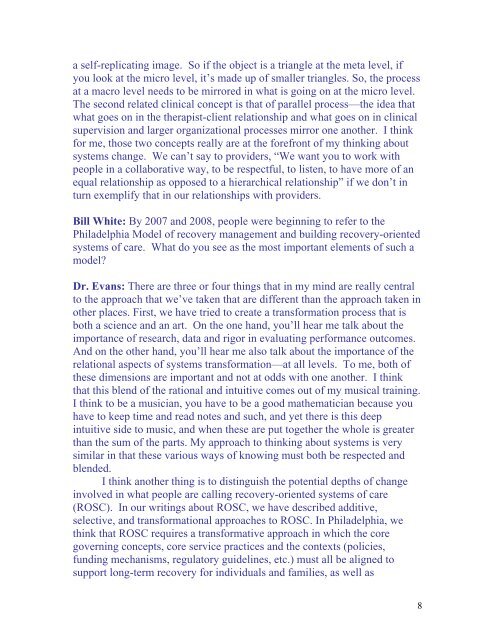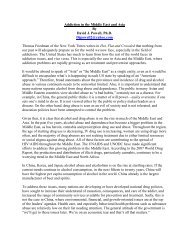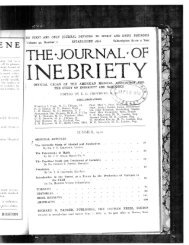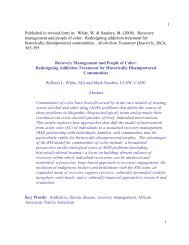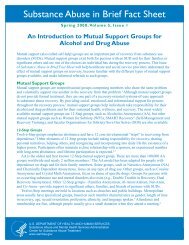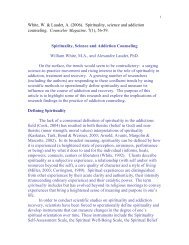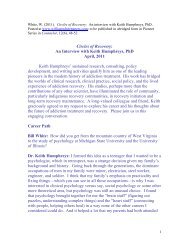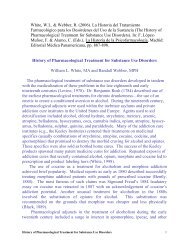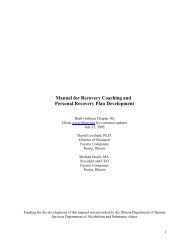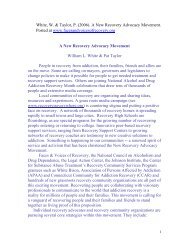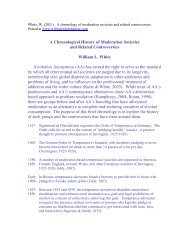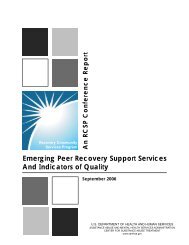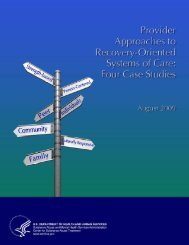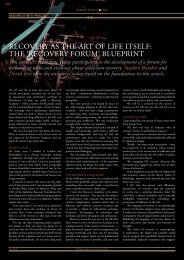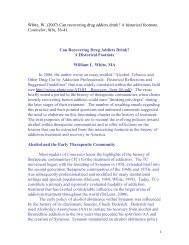An Interview with Arthur C. Evans, Jr., PhD Dr. Arthu - William L. White
An Interview with Arthur C. Evans, Jr., PhD Dr. Arthu - William L. White
An Interview with Arthur C. Evans, Jr., PhD Dr. Arthu - William L. White
- No tags were found...
You also want an ePaper? Increase the reach of your titles
YUMPU automatically turns print PDFs into web optimized ePapers that Google loves.
a self-replicating image. So if the object is a triangle at the meta level, ifyou look at the micro level, it’s made up of smaller triangles. So, the processat a macro level needs to be mirrored in what is going on at the micro level.The second related clinical concept is that of parallel process—the idea thatwhat goes on in the therapist-client relationship and what goes on in clinicalsupervision and larger organizational processes mirror one another. I thinkfor me, those two concepts really are at the forefront of my thinking aboutsystems change. We can’t say to providers, “We want you to work <strong>with</strong>people in a collaborative way, to be respectful, to listen, to have more of anequal relationship as opposed to a hierarchical relationship” if we don’t inturn exemplify that in our relationships <strong>with</strong> providers.Bill <strong>White</strong>: By 2007 and 2008, people were beginning to refer to thePhiladelphia Model of recovery management and building recovery-orientedsystems of care. What do you see as the most important elements of such amodel?<strong>Dr</strong>. <strong>Evans</strong>: There are three or four things that in my mind are really centralto the approach that we’ve taken that are different than the approach taken inother places. First, we have tried to create a transformation process that isboth a science and an art. On the one hand, you’ll hear me talk about theimportance of research, data and rigor in evaluating performance outcomes.<strong>An</strong>d on the other hand, you’ll hear me also talk about the importance of therelational aspects of systems transformation—at all levels. To me, both ofthese dimensions are important and not at odds <strong>with</strong> one another. I thinkthat this blend of the rational and intuitive comes out of my musical training.I think to be a musician, you have to be a good mathematician because youhave to keep time and read notes and such, and yet there is this deepintuitive side to music, and when these are put together the whole is greaterthan the sum of the parts. My approach to thinking about systems is verysimilar in that these various ways of knowing must both be respected andblended.I think another thing is to distinguish the potential depths of changeinvolved in what people are calling recovery-oriented systems of care(ROSC). In our writings about ROSC, we have described additive,selective, and transformational approaches to ROSC. In Philadelphia, wethink that ROSC requires a transformative approach in which the coregoverning concepts, core service practices and the contexts (policies,funding mechanisms, regulatory guidelines, etc.) must all be aligned tosupport long-term recovery for individuals and families, as well as8


